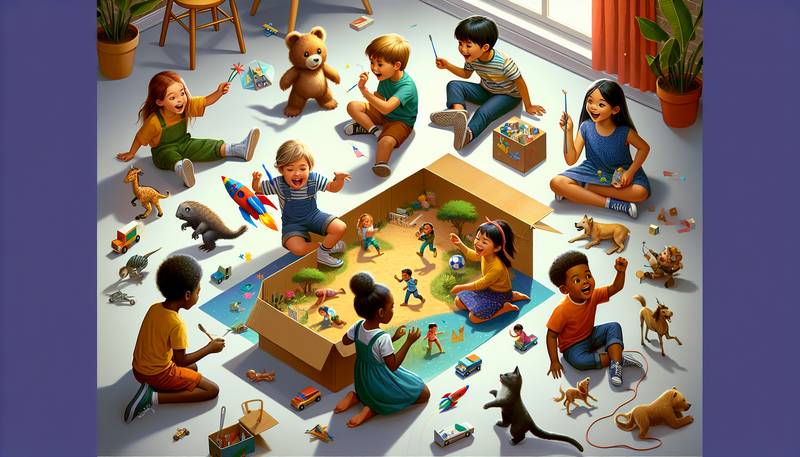The Astonishing World of Children's Imaginative Play

What is Imaginative Play?When you see your little ones playing with their toys, you can't help but marvel at the limitless world of their imagination. Imaginative play, also known as pretend play or make-believe, is a significant aspect of childhood development that allows kids to flex their creative muscles and express themselves freely. It's the wild, uncharted territory where cardboard boxes become rocket ships, and the living room floor turns into an unexplored jungle. Whether it's a solo act or a group gig, this type of play is a critical driver of cognitive, emotional, and social growth.The Enormous Benefits of Imaginative PlayNow, you might think that this kind of play is nothing more than a fun way to pass the time—and you'd be right! But beyond the giggles and smiles, there's a whole lot happening under the surface. Here are some of the most significant ways imaginative play influences children's development:1. Boosts Cognitive SkillsWhen kids engage in imaginative play, they're exercising their brains in a major way. They're learning how to think abstractly, solve problems, and develop their memory skills. Inventing scenarios and characters also allows them to practice their language and communication abilities.2. Enhances Emotional IntelligenceEver seen a toddler act out a scene with their dolls or action figures? By doing so, they're exploring different emotions and learning how to express them appropriately. Imaginative play helps children understand their feelings and those of others, fostering empathy and emotional regulation.3. Encourages Social SkillsWhen kids play pretend with others, they're learning crucial social skills like cooperation, negotiation, and perspective-taking. They also develop their ability to follow and create rules, which is essential for making friends and thriving in group settings.4. Fosters Creativity and Self-ExpressionLet's face it, the world needs more creative thinkers, and imaginative play helps to cultivate this skill from an early age. It allows children to break free from the constraints of reality and explore the fantastical realms of their minds, all while discovering their unique sense of self.Tips to Encourage Imaginative PlaySo, how can parents and caregivers help to stimulate imaginative play in their children? Here are some tips to get those creative juices flowing:- Provide open-ended materials: Toys that can be used in multiple ways (like blocks, dress-up clothes, and art supplies) allow children to take charge and create their own narratives.
- Limit screen time: Although technology can be educational and entertaining, too much screen time can stifle creativity. Encourage kids to engage in more hands-on activities.
- Join in on the fun: Participate in your child's imaginative play by taking on a role or offering suggestions, but remember to let them take the lead.
- Create spaces for play: Dedicate an area in your home for dress-up, building, or art projects to make it easy for kids to engage in imaginative play.
- Allow for unstructured playtime: Ensure that children have time in their day to play freely without being bogged down by too many scheduled activities.
Imaginative Play in the Broader Context of Children's DevelopmentIt's no secret that our world is becoming increasingly complex and competitive. To prepare our little ones for the challenges that lie ahead, it's essential to nurture their imaginations and foster their innate creative abilities. Imaginative play is not just a frivolous pastime; it's a vital component of childhood development that can set the stage for a lifetime of success and happiness.So, the next time you see your child talking to an invisible friend or sailing across the room on a broomstick, don't just dismiss it as silliness. Embrace the magic of their imagination, and take pride in the knowledge that you're helping to shape the innovative thinkers and compassionate leaders of tomorrow.
|
|







